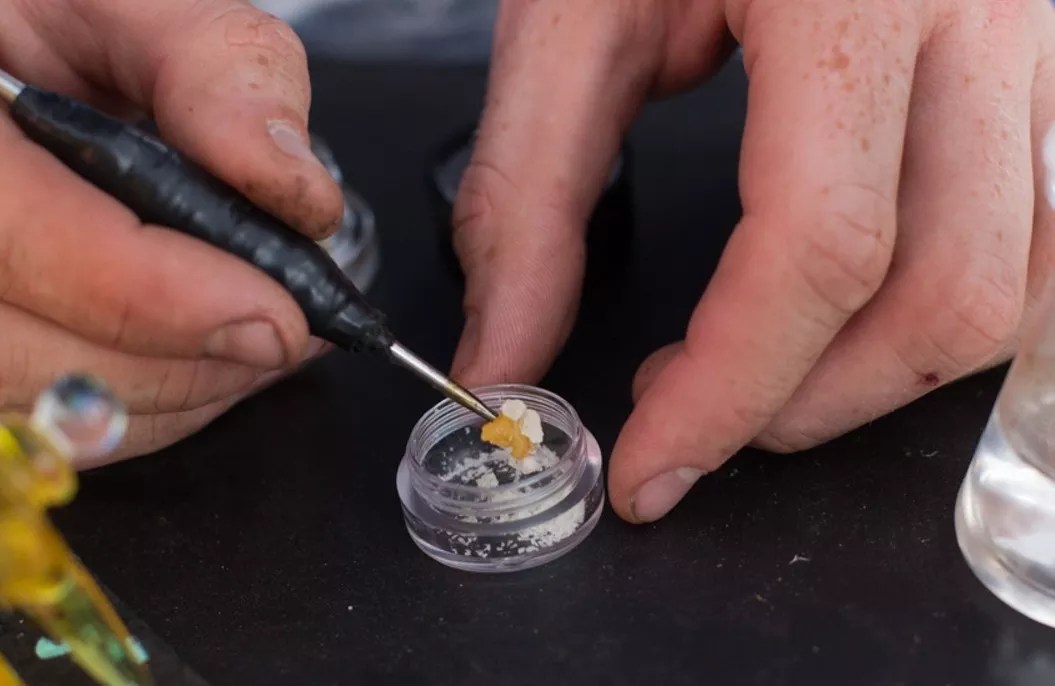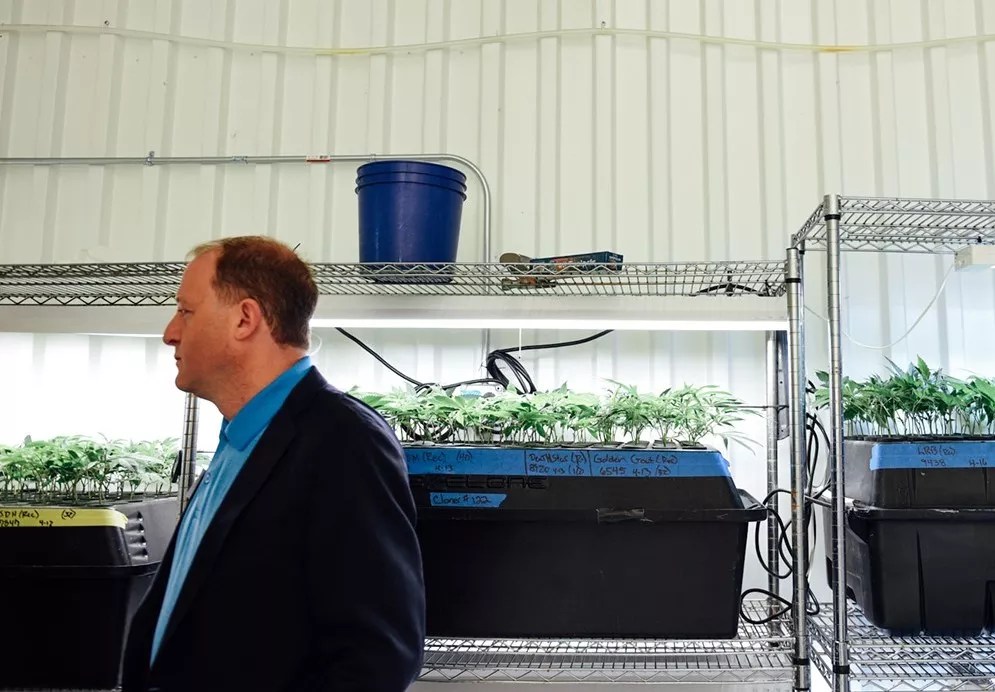
Thomas Mitchell

Audio By Carbonatix
Medical marijuana activists and patients feel like they’ve been put on the back burner since recreational pot was introduced in Colorado, and now they’re turning up the heat.
Colorado’s medical marijuana program dates back to 2000, and served as the foundation for today’s multibillion-dollar recreational cannabis industry. But state laws and regulations enacted since January 2014, when recreational pot sales first began, have significantly limited medical marijuana access, according to Bridget Seritt, a medical marijuana patient for autoimmune disorders and co-founder of Advocates for Compassionate Therapy Now.
“We’re seeing a lot of our families no longer able to access medical cannabis for themselves or loved ones. The program really doesn’t meet the needs of our patients anymore,” says Seritt, who helps patients find cannabis medication and lobbies on behalf of medical marijuana access.
Although laws limiting home cultivation and changing the state’s medical marijuana caregiver program had already impacted the patient community, the biggest hits came in 2021. That’s when the Colorado Legislature passed a bill adding new restrictions to medical marijuana applications, recommendations and sales.
A controversial measure that was described as an attempt to curb youth use of extracted marijuana products, House Bill 21-1317 called for requiring physicians who recommend medical marijuana to have their diagnosis approved by another physician, as well as including a recommended THC dosage amount on medical marijuana. It also asked for medical and mental health reviews for medical marijuana patients and further limits to the amount of extracted THC products that patients could purchase per day. And the bill called for even more limitations for patients, especially those ages eighteen to twenty, as well as a state tracking system on medical marijuana patients.
The bill was hotly contested by the medical marijuana patient community, but ultimately passed with wide support from lawmakers, with protecting children from potent THC products most often cited as the reason for their support.
“Since recreational [marijuana] came about, we’ve had fifty or sixty bills that have regulated medical or recreational cannabis in some way that has shaved off access for us,” Seritt says. “This [HB 1317] is pretty much a culmination of everything.” And the community has been feeling the pain since the provisions of the bill were enacted into law at the start of last year.
Seritt’s organization and other advocacy groups met over the summer to draft legislation that would roll back some of the bill’s ramifications while adding a few new provisions of their own, such as legalizing medical marijuana telemedicine. The collective has persuaded a group of bipartisan lawmakers to support their plan, with Senator Kevin Van Winkle and Representative Matt Soper, both Republicans, as well as Senator Sonya Jaquez Lewis and Representative Marc Snyder, both Democrats, sponsoring Senate Bill 23-081.
“It doesn’t cover everything that is hurting us. We didn’t add cultivation language, which is a big issue for us, but we’ve tried to ease some of the purchase limits. We’ve also tried to protect doctors, so they feel comfortable recommending cannabis and they lower their prices, which were raised significantly last year,” Seritt notes.
Cannabis policy reform group Americans for Safe Access called HB 1317 “the single worst rollback of medical cannabis and patient rights” that the organization has ever seen in the country. In its most recent round of state report cards for medical marijuana programs, Colorado received an overall C+, with an F in the patient rights and civil protections category.
“Legislators must recognize that patients are leaving the medical cannabis program due to added financial obligations and hurdles that have been added in recent years, and not because the adult use/recreational market is a suitable replacement. Physicians are pulling out of the program due to concerns over professional licenses, which makes it hard for patients to find a physician willing to provide a recommendation – a hurdle that becomes insurmountable when some patients are now required to have more than one physician recommendation to be allowed access,” Colorado’s 2023 report card states.
According to the state Department of Public Health & Environment, the number of registered medical marijuana patients in Colorado as of December 2022 was 71,536, nearly 18 percent lower than the total a year earlier. This is the lowest number of registered patients since 2010.
Cannabis-friendly doctors are leaving at an even higher rate than patients, according to Martha Montemayor, owner of medical marijuana practice Healthy Choices Unlimited and founder of Cannabis Clinicians Colorado, a network of health-care professionals interested in cannabis treatment. Of the 27,000-plus licensed physicians in Colorado, just over 300 are currently considered cannabis-friendly, Montemayor notes.
“The doctors were dropping off because of the restrictions and their loss of autonomy to diagnose,” she says. “The Colorado Board of Health was very strong in saying that they couldn’t think of any other substance or activity that a doctor would give that limits their right to diagnose.”
The lack of doctors and increased scrutiny by the state has increased the price of medical marijuana visits. Seritt says that she can’t afford the payments and traveling requirements to procure her medication, so she’s back to buying it on the black market.
Michelle Walker is the mother of Vincent, a teenage medical marijuana patient. He’s autistic, and uses forms of extracted cannabis to help subdue aggression and increase cognitive and verbal ability. Walker says she pays around $1,000 a year on doctor visits for Vincent’s medical marijuana recommendation, none of which is covered by insurance.
“They’re scared. I don’t fault the physicians. They worry about their livelihood,” Walker says. “But we’re not seeing guardrails working like we need them to, and no one honors them the way we need them to.”

House Bill 1317 added several new layers of protocol for medical marijuana patients and their physicians.
Jacqueline Collins
The new bill, dubbed “Access to Medical Marijuana,” would remove restrictions on medical marijuana doctors that were enacted by HB 1317 and also allow medical marijuana patients to purchase more concentrate per day while still staying under a monthly limit. Currently, patients can purchase 8 grams of concentrated THC per day at dispensaries, with homebound, disabled and geographically deprived patients eligible for extended purchases – but finding dispensaries willing to honor those extensions can be challenging, according to Walker.
If SB 081 passes, the daily concentrate limit would be removed, but patients would still be under a monthly limit of 240 grams. This would require fewer trips to the dispensary for vulnerable and homebound patients and caregivers of patients, according to bill proponents.
The bill would also legalize telemedicine evaluations and visits for medical marijuana patients. Although telemedicine is allowed for doctor consultations in Colorado, medical marijuana telemedicine visits are banned under state law. Executive orders from Governor Jared Polis during the COVID-19 pandemic allowed doctors to conduct medical marijuana consultations via telemedicine in 2020 and part of 2021, but the service was eventually banned again when the executive orders expired.

Jared Polis toured a commercial marijuana grow in 2018.
Kenzie Bruce
Although the week-old measure already has four bipartisan sponsors and supporters have been careful to say that the bill isn’t directly aimed at HB 1317 but rather a number of issues, vocal opposition is still expected.
HB 1317 was initially introduced by former House speaker Alec Garnett, now Polis’s chief of staff, and former state representative Yadira Caraveo, a licensed pediatrician who was elected to Congress in November. Sponsored and championed by Democrats, the bill received little opposition from legislators, who argued that consumption of high-potency THC products, such as THC oil, wax, shatter, live resin and rosin, was becoming a rapidly increasing problem among Colorado teenagers.
“Too many young Coloradans have experienced devastating health impacts after consuming high-potency products,” Garnett said in support of HB 1317. “I’m proud of Colorado’s well-regulated and thriving marijuana industry, and I’m proud of how we are leading the way to learn more about high-potency products. The law we passed strikes a balance to protect access for patients and keep high-potency concentrates away from kids who shouldn’t have them.”
Colorado health professionals had declared a state of emergency in youth mental health in 2020, listing marijuana as one of several contributing factors. Although youth use of marijuana in the state has remained flat since recreational legalization, use of extracted marijuana products has doubled since 2015, according to the CDPHE. Most of these products are consumed by electronic and manual vaporization, also known as dabbing, and have been shown to impact developing brains in people 25 and under.
There is no data linking teenage medical marijuana patients to a spike in youth marijuana use, but stronger restrictions for medical marijuana access and concentrated THC products were pushed by lobbies representing parents, health-care organizations and anti-legalization groups at the start of the 2021 legislative session.
Since HB 1317 has taken effect, the number of registered medical marijuana patients ages eighteen to twenty has gone from nearly 3,500 to just over 1,500, CDPHE data shows.
Two lobbying groups largely made up of mothers – Blue Rising and One Chance to Grow Up – have already signed on to officially oppose the bill with the Colorado Secretary of State’s Office, as has the Colorado Psychiatric Society. Neither Blue Rising nor One Chance to Grow up responded to requests to comment on the new bill.
Also quiet about SB 081 is the recreational marijuana industry. Although at least five major marijuana companies or industry groups say they are “monitoring” the bill, none have signed on to support SB 081.
“I think we’ll see evolving positions on this very soon,” predicts Kevin Gallagher, executive director of the Colorado Cannabis Manufacturers Association. “I haven’t talked with any business that says this is a terrible idea.”
Medical marijuana prices and sales, already on the decline, hit record lows in 2022. Gallagher admits that the bill would help boost sales for medical dispensaries and extraction labs, but says the measure is more about patient access than saving fledgling dispensaries.
“A lot of our members still choose to serve the medical market. There has certainly been a direct correlation between patients losing access and businesses struggling to survive,” Gallagher says. “There are so many patients out there with very compelling experiences that need to be heard, though. The patient community doesn’t have the same resources that the industry does.”
The bill’s first hearing is currently scheduled for Thursday, February 9, with the Senate Health & Human Services Committee.